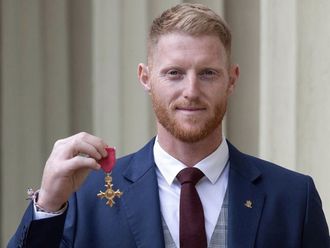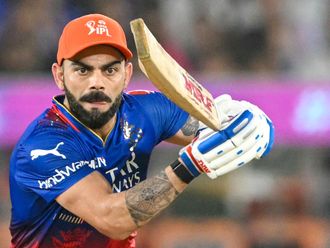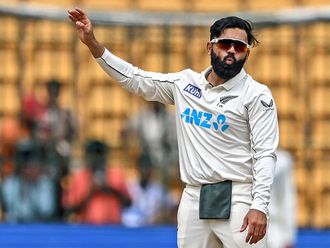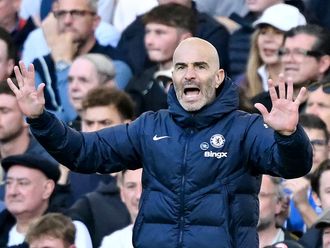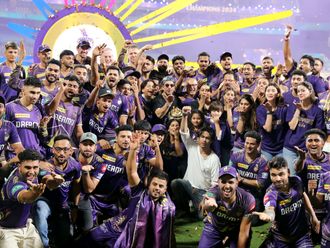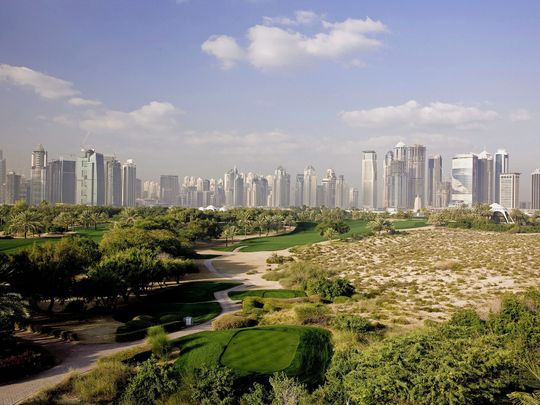
Sustainability has become a priority not just globally, but specifically in Dubai, and the game of golf is able to play its own part in helping to be sustainable in various forms.
Whether it is in the operations of existing courses, the design and construction of new developments, to within the venues themselves.
As we are in 'Sustainable Golf Week', we delve deeper into what the golf courses in the emirate are doing to push the current sustainability drive in Dubai.
There are five courses in the UAE that have agreed to the ‘Sustainable Golf Pledge’ certified by the GEO Foundation for Sustainable Golf.
These golf courses are Dubai Creek Golf & Yacht Club, Emirates Golf Club, Jumeirah Golf Estates, The Montgomerie Golf Club Dubai and Trump International Golf Club Dubai.
The agreement involves the following:
“We are committed to social and environmental responsibility, in and through golf.”
“We recognise the importance of playing our part to protect and restore nature, conserve resources, take climate action and strengthening communities.”
“We will seek to use our reach to raise awareness and positive action amongst golfers, partners and the wider public.”
“We will make an important difference, and help golf become a valued leader in sustainability.”
Furthermore, three of those five courses are GEO Certified. An award which is the most widely regarded and credible sustainability distinction in golf. Those courses are, Dubai Creek Golf & Yacht Club, Emirates Golf Club and Jumeirah Golf Estates, all managed by Dubai Golf.
Here we look specifically into what golf clubs in Dubai are doing specifically to be more sustainable.
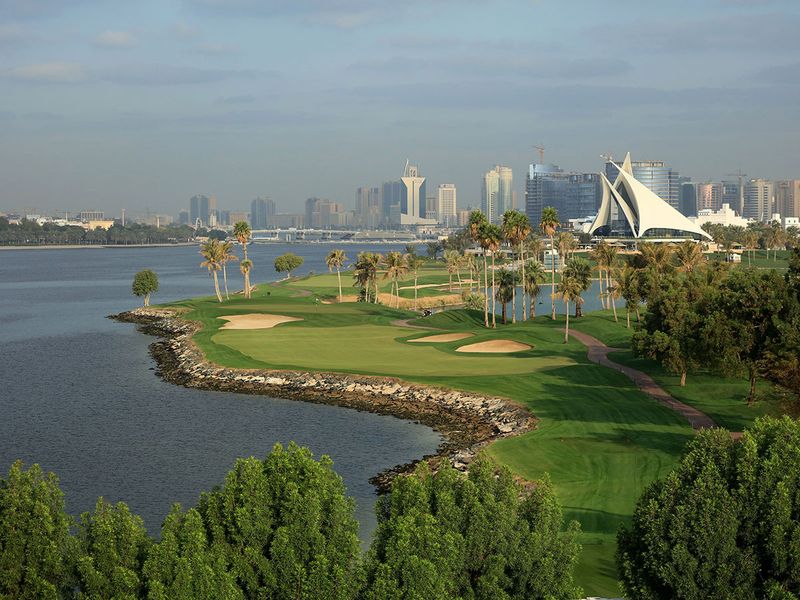
Dubai Creek Golf & Yacht Club:
Golf at Dubai Creek Golf & Yacht Club has sustainability clearly at its core. They use eco-friendly technologies to minimise resource consumption, and integrate golf course maintenance within the natural environment, all to promote a balance between golf traditions and environmental responsibility.
Accelerating their way towards a sustainable low-carbon future, Dubai Creek Golf and Yacht Club installed Dubai Electricity and Water Authority’s (DEWA) Electric Vehicle Green Chargers, a Public Charging Station.
DEWA Electric Vehicle Green Chargers
Each station is able to charge two vehicles at a time. So members and guests are able to leave their vehicles to charge whilst enjoying a round of golf.
The sustainability even heads indoors at the Creek. Meat, half-eaten pizza slices, fruit peels, paper and other organic waste is being churned into water and fertiliser to reduce the amount of waste sent to the landfill.
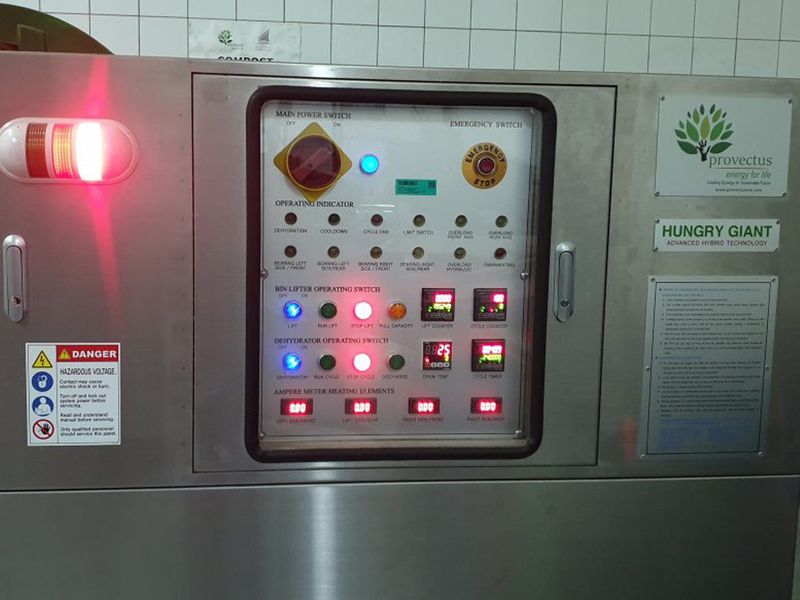
By recycling their waste on-site, they are therefore reducing their carbon footprint and saving money. As a result, the club have reduced the volume of food waste sent to landfill by 75%.
When it comes to the course, Dubai Creek has removed overseeding practice from the golf course which has reduced water consumption by 25%. The removal of non-native landscape planting has helped save water, while at the same time in partnership with a local charity they have planted over 300 native low water use trees.
Monthly water tests have been implemented to determine how much nutrients they were applying just through irrigation. This has now eliminated all excess fertiliser applications so then they can give the grass exactly what it needs.
Finally, in partnership with Rolls-Royce, Dubai Creek has recently installed four beehives on their property in a UAE wide campaign to breed Emirati Queen bees.
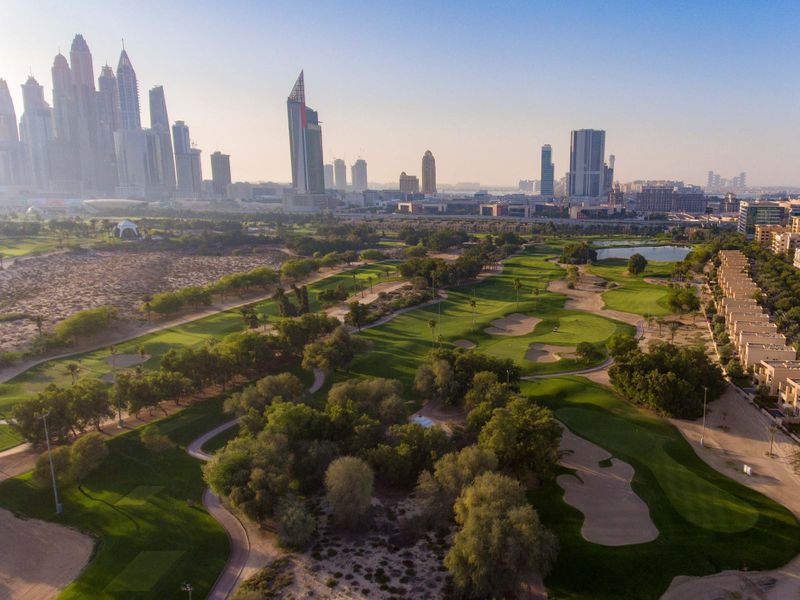
Emirates Golf Club:
Plastic bottles are one of the key single-use plastic pollutants globally, with staggering statistics indicating that, 40% of plastic is used just once and the lifespan of a single-use plastic water bottle is 15 minutes and average decomposition rate of the same bottle is over 450 years.
As part of its ‘Planet or Plastic’ campaign, National Geographic teamed up with Emirates Golf Club in the past to support the club in reducing its usage of single-use plastic. Still to this day Emirates Golf Club is focusing on reducing its use of plastic water bottles, which stood at 200,000 plastic bottles distributed at the club back in 2017.
As a result of the campaign, Emirates Golf Club was happy to announce that is committed to reducing its use of plastic bottles, straws and bag, across the whole of the club and Dubai Golf.
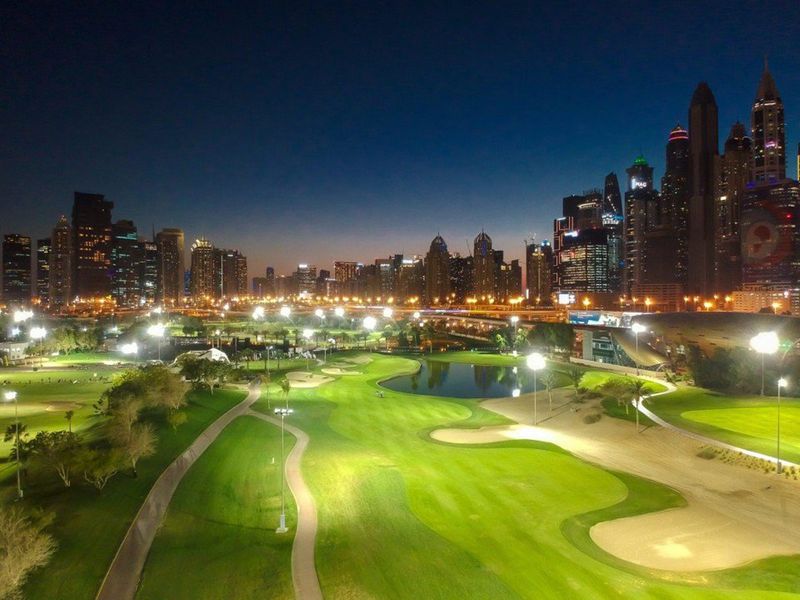
The Faldo Course at Emirates Golf Club was the first in the region to use energy-efficient LED light technology. Etihad Energy Service Company (Etihad ESCO), a wholly-owned subsidiary of DEWA, partnered with ‘Abacus Lighting’ to fully retrofit Emirates Golf Club’s 18-hole Faldo Course to replace its existing metal halide solution with LED lighting.
The sustainable lighting system improves the overall quality of light across the golf course, while enhancing energy savings by 60% and reducing CO2 emissions.
The golf course maintenance team are doing their bit to help as well. The team repurpose many things disposed of by other departments within Emirates Golf Club. Wooden pallets have been used to make boxes for the back of golf carts so they can be used for multiple uses. While also green shade netting is used to keep grass clippings in after mowing, meaning plastic bags are no longer required.
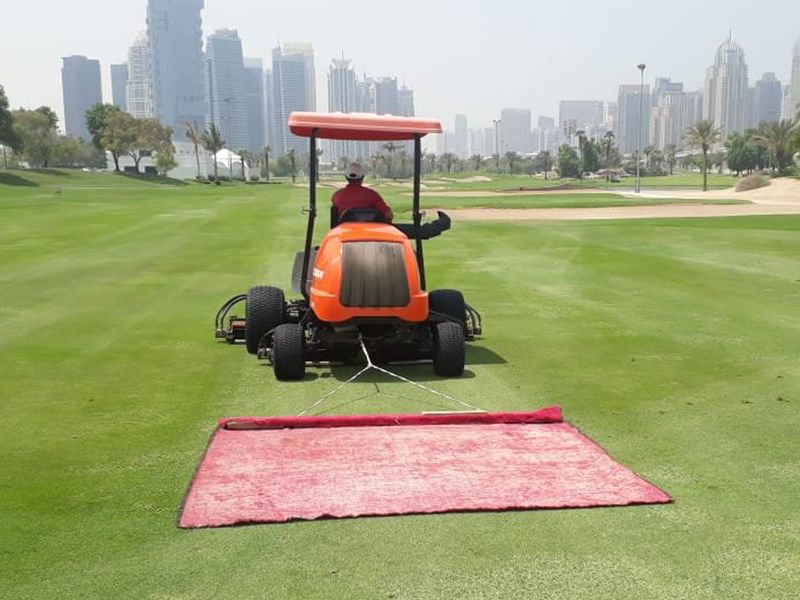
Carpet that was being thrown away now is taken by Golf Course Maintenance to be shaped and attached to Fairway mowers so that they can drag the grass clippings in so it's clean and the use of a blower is reduced to clean the mess up after.
You may not know it, but there is a large animal population in and around the Emirates Golf Club.
At EGC they have released Hawks and two Desert Eagle Owls by means of a hacking project done by ‘Wild Flight’ to help control and manage the Indian hooded crow population. It was remarkable the speed once the Hawk and Owls’ were used that many species returned such as songbirds and migratory birds.
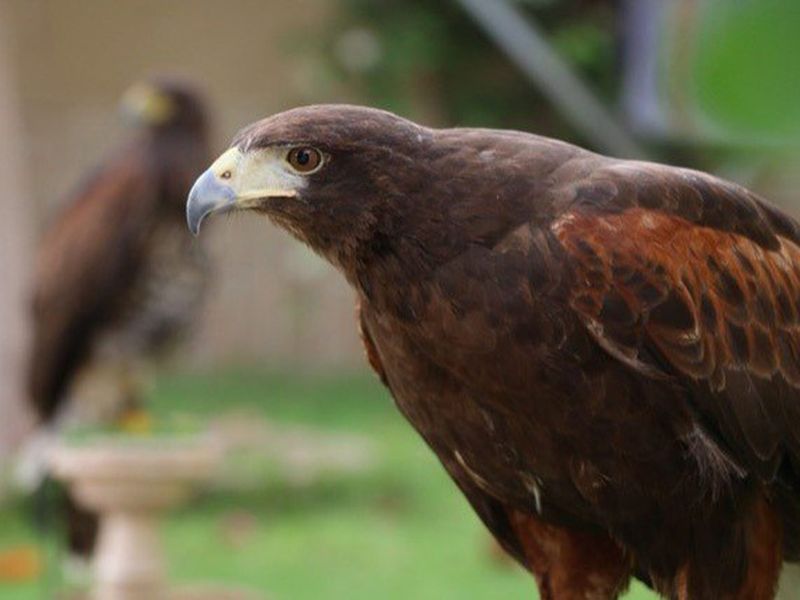
The number of Arabian Red Fox has increased in size over the past as a result of the club relocating their den on the course and making sure this area is protected.
The club frequently see three of the Arabian Red Fox’s together in the evenings and early mornings on the Majlis course which has become a great haven for them to live, as there is abundant undergrowth and a vast amount of animals for them to hunt.
Like Dubai Creek, and multiple golf courses in the emirate, Emirates Golf Club installed recycling bins on the golf course every third hole. This is to obtain the maximum amount of waste that can be recycled. And also, let’s not forget they have also installed the Dubai Electricity and Water Authority’s (DEWA) Electric Vehicle Green Chargers, a Public Charging Station.
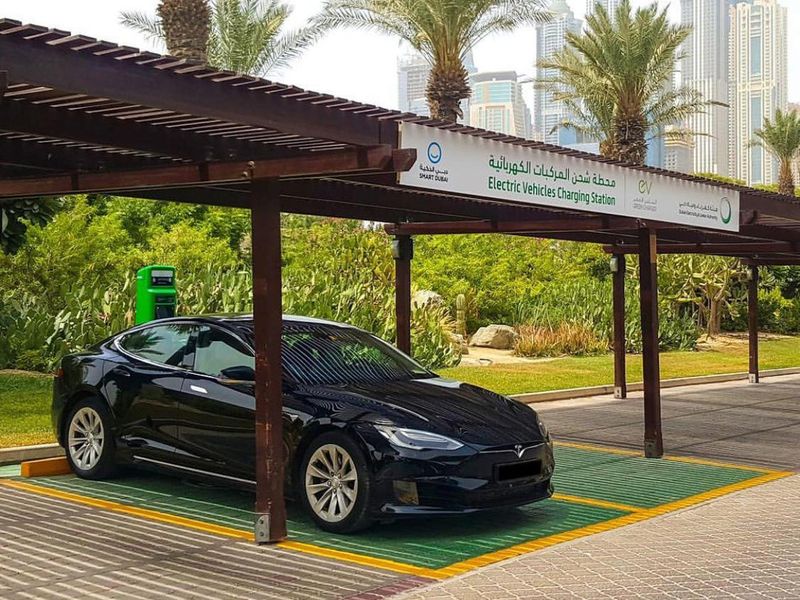
Staying on the car theme, during the summer, solar panel car parking was also installed to harness renewable energy to generate enough power for the floodlights on the Faldo Golf Course.
Sustainability helps preserve the environment, conserve resources, and reduce the ecological impact of golf courses. It also aligns with global efforts to combat climate change and demonstrates responsible stewardship of natural resources to help educate their guests on ways to be more sustainable.
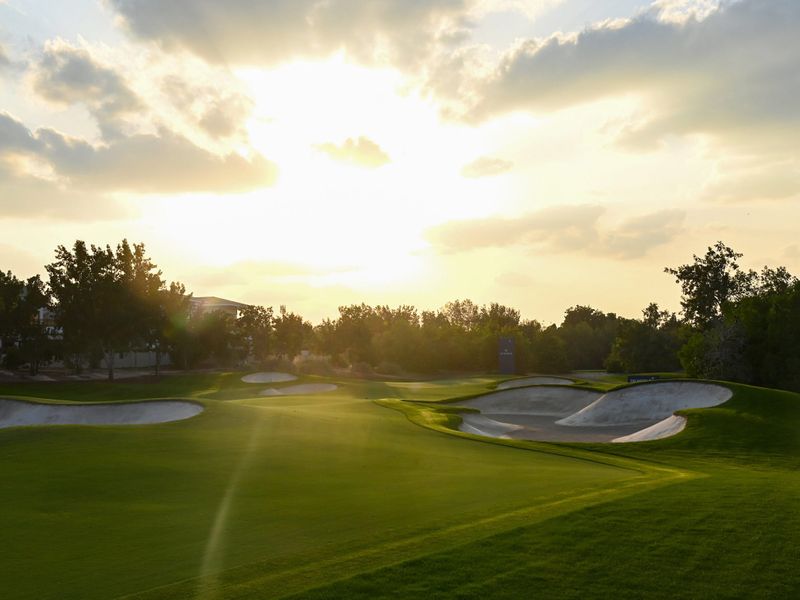
Jumeirah Golf Estates:
On 14th April 2018, Jumeirah Golf Estates honoured Sheikh Zayed’s vision of sustainable development through an extensive tree planting programme. As part of the UAE’s “Year of Zayed” celebrations across the country, JGE began planting over 200 Ghaf trees, the national tree of the UAE, across the Fire Golf Course.
A ceremony to celebrate the planting of the first Ghaf tree took place by the 18th Green of the Fire Course initiated by HH Sheikh Fahim Bin Sultan Al Qasimi, Chairman of the Emirates Golf Federation and Mr Yousef Kazim, CEO of Jumeirah Golf Estates.
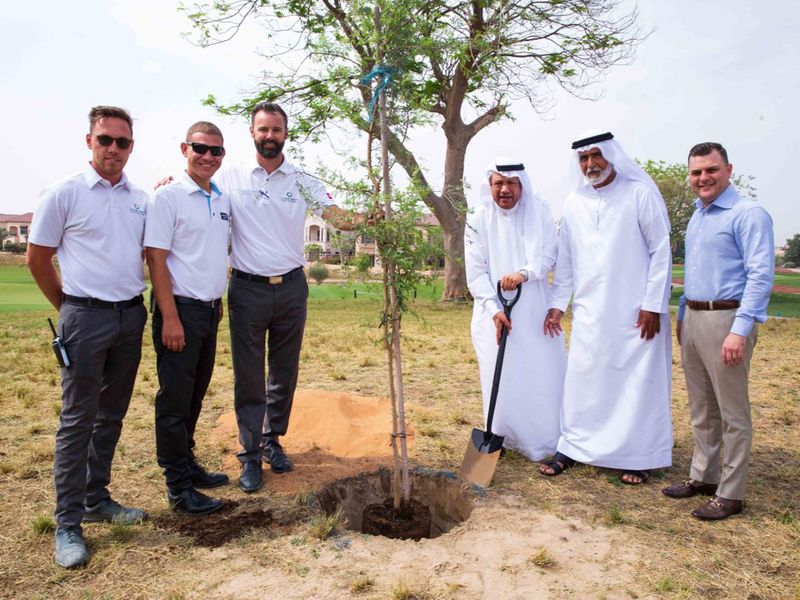
An indigenous species, specifically of the UAE, Oman and Saudi Arabia, the Ghaf (Prosopis cineraria) is a drought-tolerant, evergreen tree and one of the sturdiest plants to be found in the world’s desert environment. In their natural habitat, many bird species nest on the Ghaf including desert eagle owl, brown-necked raven, yellow-throated sparrow and long-legged buzzard.
If you didn’t know, Jumeirah Golf Estates has two golf courses, each with its own unique flora and fauna. The Earth Course is a more typical parkland course with large trees, shrubs and lakes, the forest floor has a thin covering of bark mulch which is a perfect place for insects to live.
The Fire Course on the other hand has far fewer trees and these are primarily native. Outside the turf corridors, Fire has large areas of open native grasses which host a different set of bird species than Earth. The club has created an environment for birds to thrive by providing shelter, food sources and sanctuary; across parkland, savanna grassland, lakes and scrub.
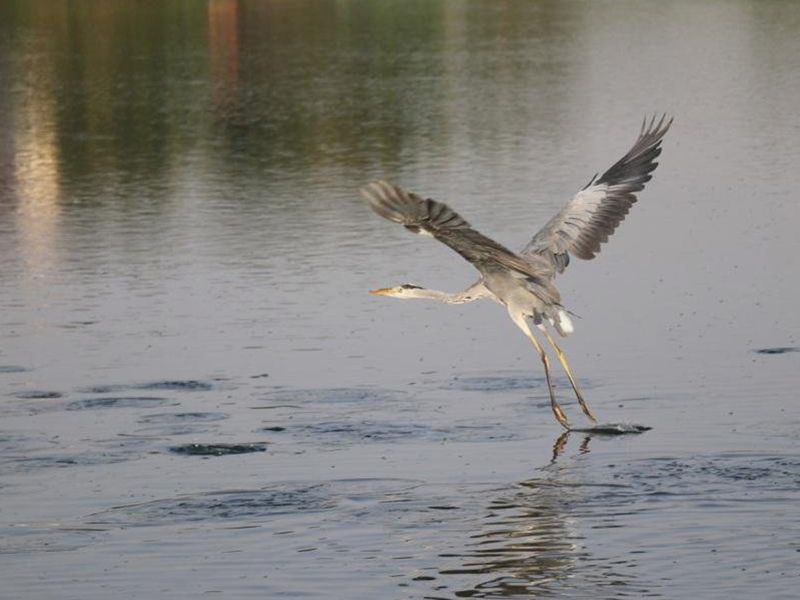
Their current bird count is nearing 40 varieties many of which are native to the UAE and at least one of which has an IUCN Conservation status of being vulnerable.
Water is one of JGE’s most precious resources. At the club they use a water recycling plant which returns the wash water through a series of filters and a bioreactor before being used again. It is estimated that this saves use up to 700,000 litres of freshwater a year.
Investment in zero-emission tech
The Earth and Fire Courses at Jumeirah Golf Estates are routed through an urban setting and surrounded by over 1800 homes. It is recognised that having a ‘green space’ within this urban setting and with that an investment was made into zero-emission technology to keep their air clean and to reduce a carbon footprint.
To do this they use zero-emission golf carts for members and guests, zero-emission utility vehicles for the maintenance colleagues and they also offer an electric car charging station within the clubhouse car park free of charge, just like Dubai Creek and Emirates Golf Club.
During the summer of 2023, solar panel car parking was installed across JGE to harness renewable energy, provide shade for vehicles and increase the EV charging stations in a bid to reduce carbon footprint. This encourages cleaner communities, and drives the demand for renewable energy, encouraging both members, guests to utilise sustainable power.
Set an example for others
The sustainability goals of the UAE, along with the growing global concern for environmental conservation, played a significant role in the decision-making process. By demonstrating their dedication to responsible stewardship of the environment, JGE believes they can set an example for others in our community.
Jumeirah Golf Estates and it’s people have been working on sustainability initiatives for several years, with continuous efforts to improve and expand sustainability practices.
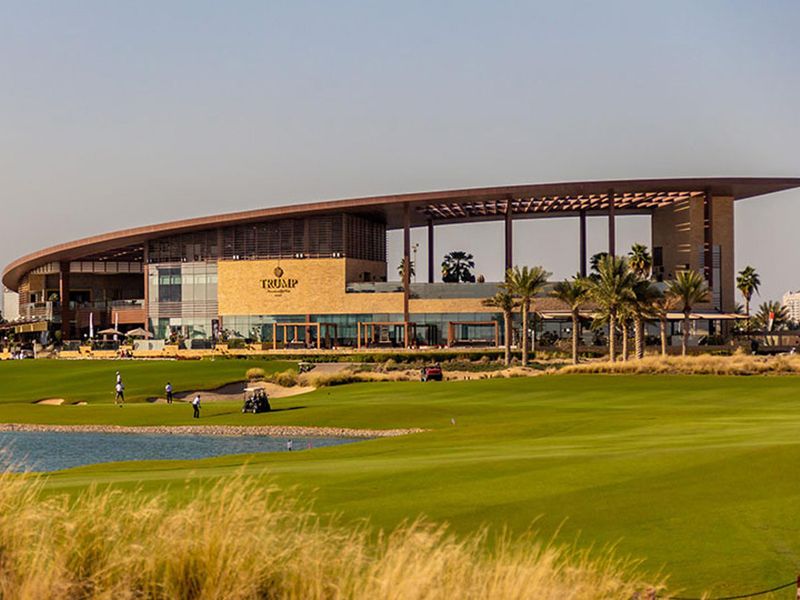
Trump International Golf Club Dubai:
Since September 2022, all members at Trump International Golf Club Dubai were issued with aluminium water bottles and 20 water refilling stations were introduced around the golf course, par three course and practice facilities which are refilled with filtered water each day.
Since September 2022, all members at Trump International Golf Club Dubai were issued with aluminium water bottles and 20 water refilling stations were introduced around the golf course, par three course and practice facilities which are refilled with filtered water each day.
Filtered dispensers with sustainable water bottles
All contractors, staff, members and guests who are onsite, have access to the filtered watering dispenser, which ensures the club is reducing their single-use plastic bottles.
Even still, all guests are encouraged to bring their own sustainable water bottle to the club or they can purchase it within the Proshop.
This has seen a reduction of over 100,000 single-use plastic bottles each year. Plastic bags have been removed from the Proshop and locker rooms which are now replaced with recycled biodegradable bags.
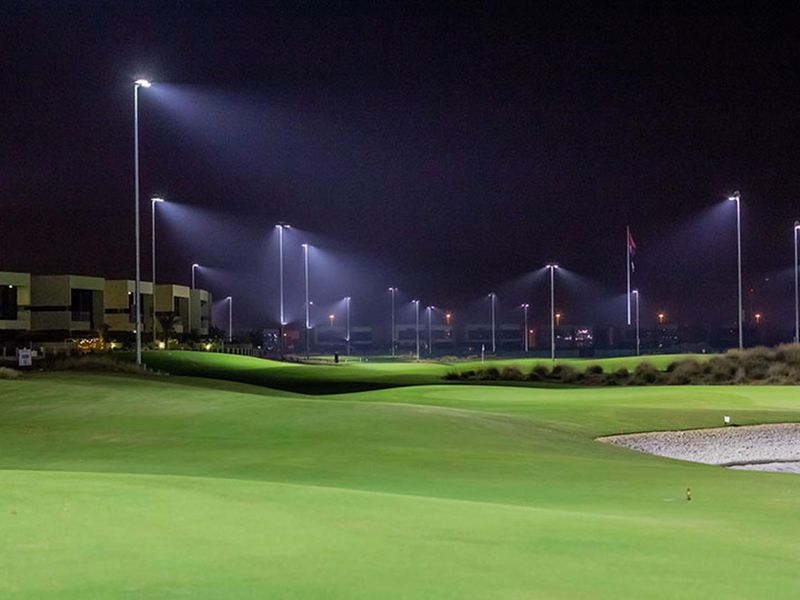
When it comes to electricity, Trump International Dubai have saved an average 16% each month YTD vs 2022 on DEWA just by turning off their MUCO flood lights hole-by-hole, on their par 3 course, after the final group each night instead of keeping all floodlights on until 22:30.
They continue to modify their light scheduling daily to meet business demands whilst being ever-cautious about saving energy.
Trump Dubai have recently installed a Rainbird IC irrigation system which is the most advanced technology on the market. This provides them with total control of the irrigation system.
This system coupled with their smart weather station allows to precisely calculate the evapotranspiration rate which tells the agronomy team exactly how much water is needed to irrigate each evening down to the nearest 1/10th of a millimetre saving on excess water waste.
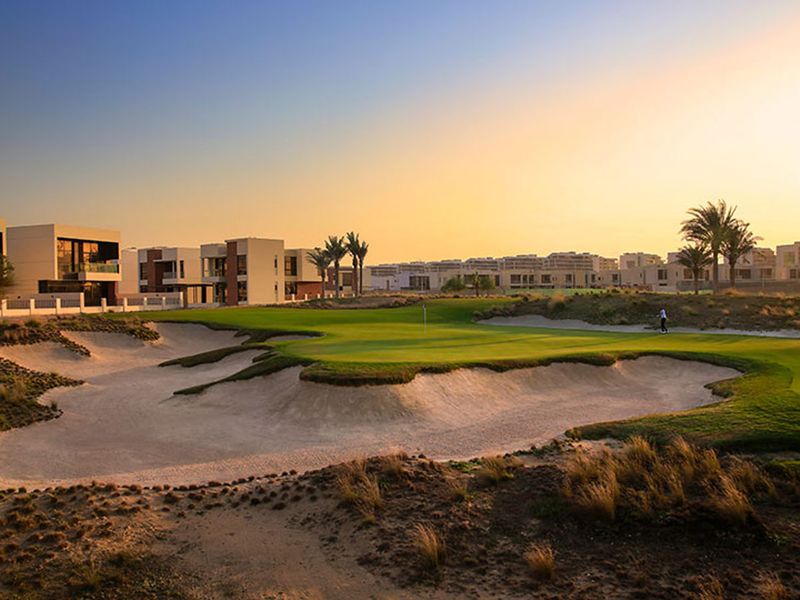
Each of the sprinklers is controlled directly from a central computer, making it possible to adjust individual runtimes based on dry areas seen on the golf course. The ability to precisely control the irrigation system saves significantly on TSE, DEWA, Chemicals and fuel needed to control excess plant growth.
Trump even has integrated a Pest Management Strategy. Whether it be fertilisers, pesticides, irrigation or cultural practices, the Trump agronomy team do not have a ‘Set and Forget’ method for golf course maintenance.
Environment and sustainability
Each application and practice goes through a well-thought-out plan that takes in all key factors such as Business demand, Turf Health and effects on environment and sustainability.
An example of this is their fungicide applications. A fungicide application may be planned and budgeted, however, the team will never apply unless it is deemed to be absolutely necessary.
This management strategy significantly reduces the inputs of fertilizers and chemicals throughout the year, reduces the likelihood of resistance issues with some chemicals, and increases the beneficial microbiology within the soils.


